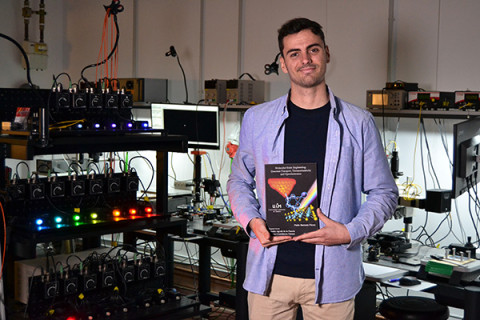Pablo Bastante is defending his thesis: "If we combine ideas, we could dream of having our phone on the skin of our arm"

Pablo Bastante is defending his PhD thesis on Thursday, January, 16, at the Salón de Actos of the Materials Science Institute of Madrid (ICMM-CSIC). His work has been directed by Nicolás Agrait de la Puente (at the Autonomous University of Madrid) and Andrés Castellanos Gómez (at the ICMM-CSIC). Entitled 'Molecular-Scale Engineering: Quantum Transport, Thermoelectricity and Optoelectronics', this research "aims to explore different molecular systems and strategies to manipulate and enhance their performance and capabilities". In the end, "the technologies explored include the design and assembly of different setups and device architectures by micro and nanofabrication techniques for the characterization of atomic and molecular scale materials, and strategies to tailor and enrich their properties."
In other words: "What we do is to develop a new generation of electronic components, the smallest we as humanity can engineer. We design molecules, from their very structure, to have the properties we desire. We fabricate electronic devices with individual molecules and materials with 1-3 atoms of thickness, and combine them for enhanced performance", says this young researcher, who adds: "We even contact molecules with one-atom-thick electrodes, the very smallest devices we can fabricate."
Bastante's thesis is very focused on its applications, which are are related to the phenomena they characterize in each of these systems. "With individual molecules, we explore strategies to enhance the thermoelectric properties, the correlation between electrical and thermal energy," he says, and then explains that the thermoelectric devices are useful to recover waste heat and produce electricity, "which can charge the battery leading to autonomous sensors". "Furthermore, they represent an alternative for heat dissipation at low power consumption, in this case with the precision of a single molecule for the implementation, improving the efficiency for instance in on-chip cooling applications".
Talking about atomically-thin materials, his strategies are focused on enhancing the optoelectronic properties, mainly for developing ultraminiaturized transistors ("the building blocks of a processor," he says), and photodetectors, sensors of light like spectrometers or cameras. "Due to their reduced thickness, devices based on these materials can be extremely flexible and transparent, ideal for wearable sensors", explains Bastante.
Finally, with molecules contacted by one-atom-thick electrodes this scientist explores the applications of these architectures for emerging technologies like quantum dots for quantum computing, a new generation of processors, and light emission for displays and optical communications with the smallest resolution and thickness possible. "If we combine ideas, we could dream of having our phone on the skin of our arm, imperceptible unless it is on, and charged by the heat of our body".
Bastante has been working at the ICMM almost since he finished his bachelor, as he got an internship that summer. "I liked what the group was working on and the way they worked. I thought I could learn a lot from Andrés, so I asked him to be my co-supervisor in my thesis."
"I wanted to become a scientist because I was curious about understanding nature and how this leads humanity to create whatever we can imagine," he remembers. And continues: "Since I was a kid I would see my dad repairing computers, he would explain to me what is inside, and what the electronic components do. Then I studied physics because I had a teacher in high school, he was a physicist himself and I liked the way he would think and explain, opposite to the rest of my classmates". At the end of his bachelor's, he worked with Nicolás and Andrés, his supervisors: "They taught me both the beauty of nature at the nanoscale and the importance of the quality of well-done work".
During this time, he summarizes the main lessons learned this way: "Collaboration gets you further, where other's success pushes all of us forward". Bastante says it is "crucial" to consider other's interests and be thankful and constructive with the feedback. And a last one, which, actually, is the one he values the most: "Things are rarely going to turn out as you think they should, and that is normally an opportunity to learn something."
Thinking about how he thinks this experience will contribute to his training and to his future, he speaks about 'soft skills': "Having experience with certain fabrication and characterization techniques can be valuable as well," he says. "The PhD is a unique opportunity to develop a set of management skills regarding organization and time as well as people and emotions, mainly if you aim to pursue a career path involving multiple projects in parallel and people working on them," he concludes.
Now, his plans once his PhD is defended are just in the short term: "I want to spend time with my family, my friends wherever they are, and myself."
Instituto de Ciencia de Materiales de Madrid (ICMM)
Sor Juana Ines de la Cruz, 3
Cantoblanco, 28049
Madrid, España
Telephone: (+34) 91 334 90 00
Email: @email
Communication Office: @email

Acknowledge the Severo Ochoa Centres of Excellence program through Grant CEX2024-001445-S/ financiado por MICIU/AEI / 10.13039/501100011033

Contacto | Accesibilidad | Aviso legal | Política de Cookies | Protección de datos
